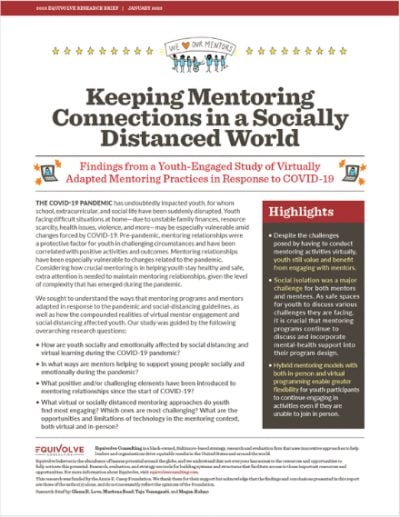Tools for Connecting
Youth engaged with their mentors using multiple virtual mediums: video meeting platforms like Zoom, telephone conversations, email and texting. Among the various options, youth seemed to prefer texting.

Being mentored helps young people — particularly young people at risk — stay healthy and safe. Yet, the COVID-19 pandemic challenged traditional strategies for engaging youth and prompted mentoring models to evolve.
This report explores how both mentoring programs and mentors adapted to social-distancing guidelines during the pandemic. It addresses research questions related to the social-emotional effects of social isolation and virtual learning and explores the benefits and challenges of using virtual mentoring models. It also offers three key recommendations aimed at helping mentoring programs better serve youth from a distance. These recommendations are:
The report ends by underscoring how innovative mentoring techniques can help youth-development organizations and programs better prepare for situations where remote support is required. It notes that the pandemic has inspired models to evolve in ways that could help mentoring programs become stronger, more agile and more sustainable over the long term.
Mentors provided youth with a space to discuss challenges around the pandemic, virtual schooling and familial relationships. Regular check-ins gave young people opportunities to explore issues that they were not eager to discuss with their parents or other adults. And, while the virtual medium didn’t click for everyone, mentors who incorporated interactive activities or some in-person interactions seemed to have the most success in engaging youth.
We hope you'll find value in this report. We’d love to get a little information from you, which we'll use to notify you about relevant new resources.